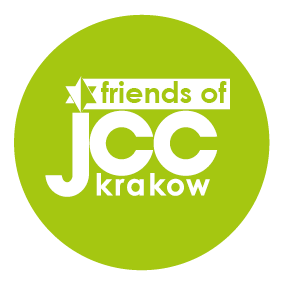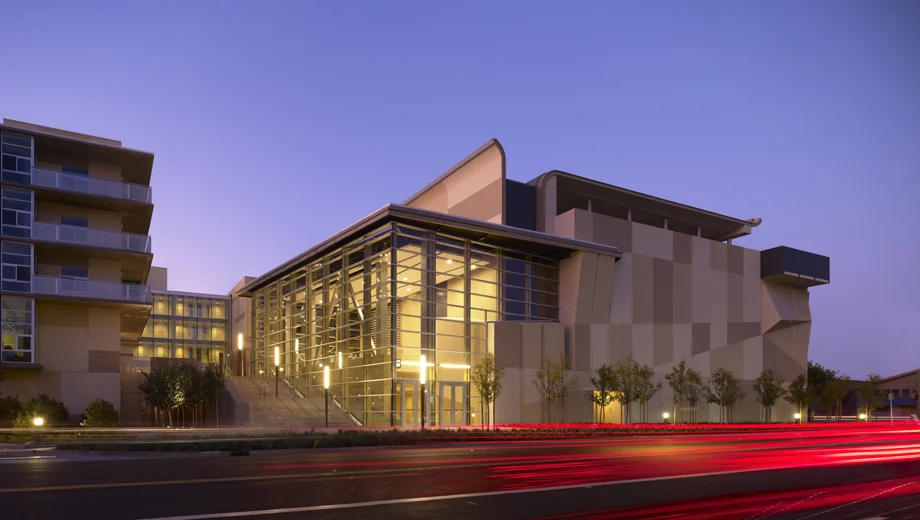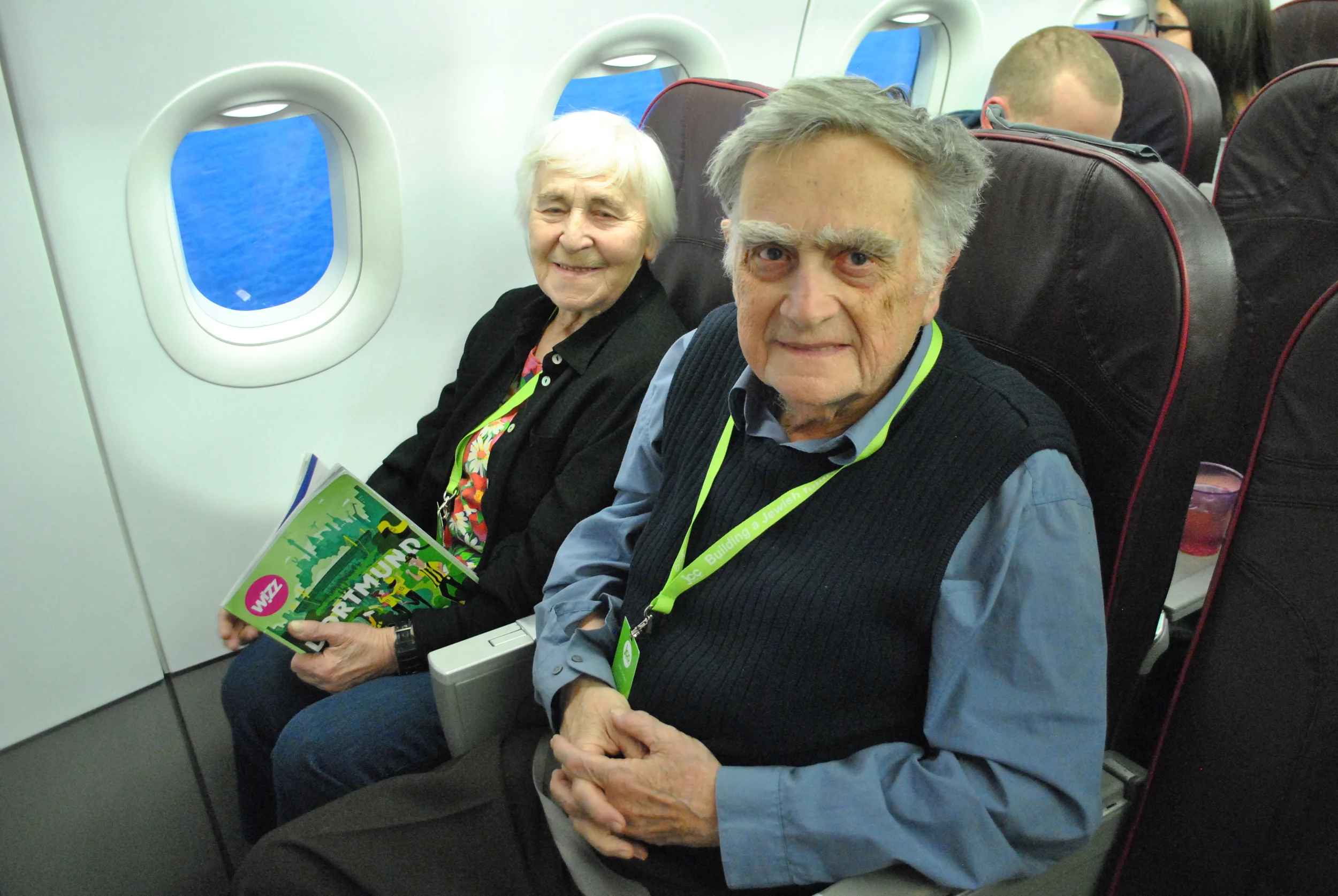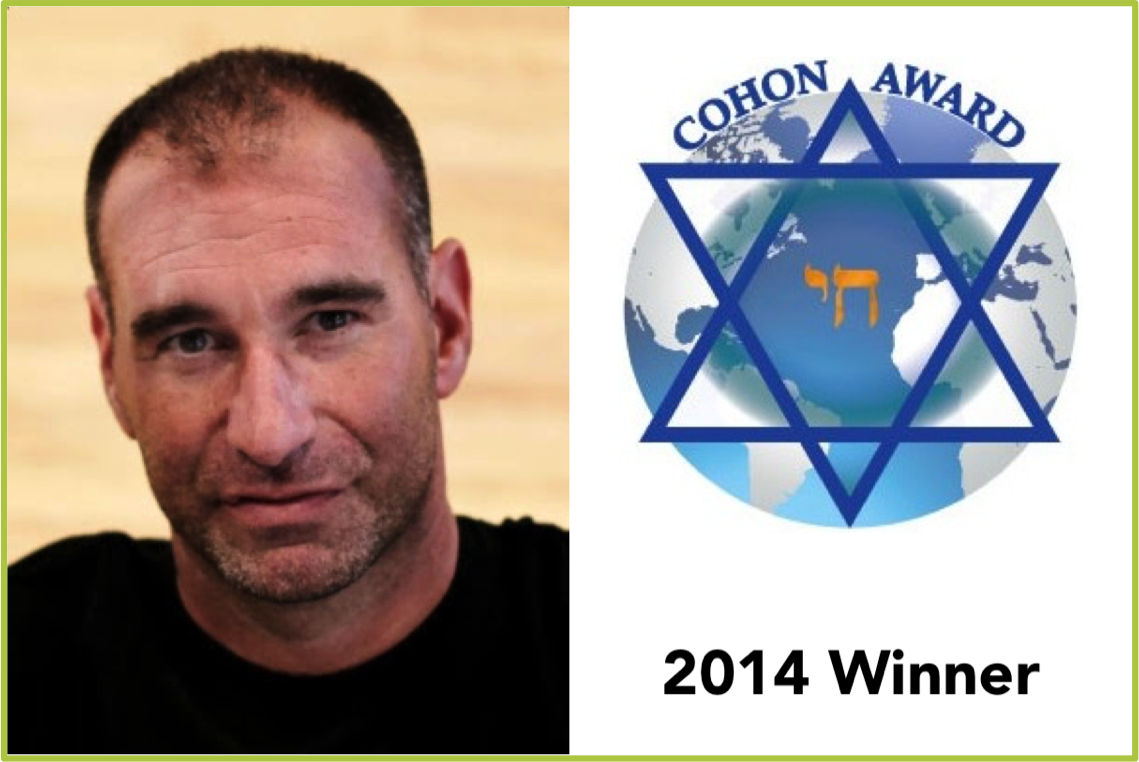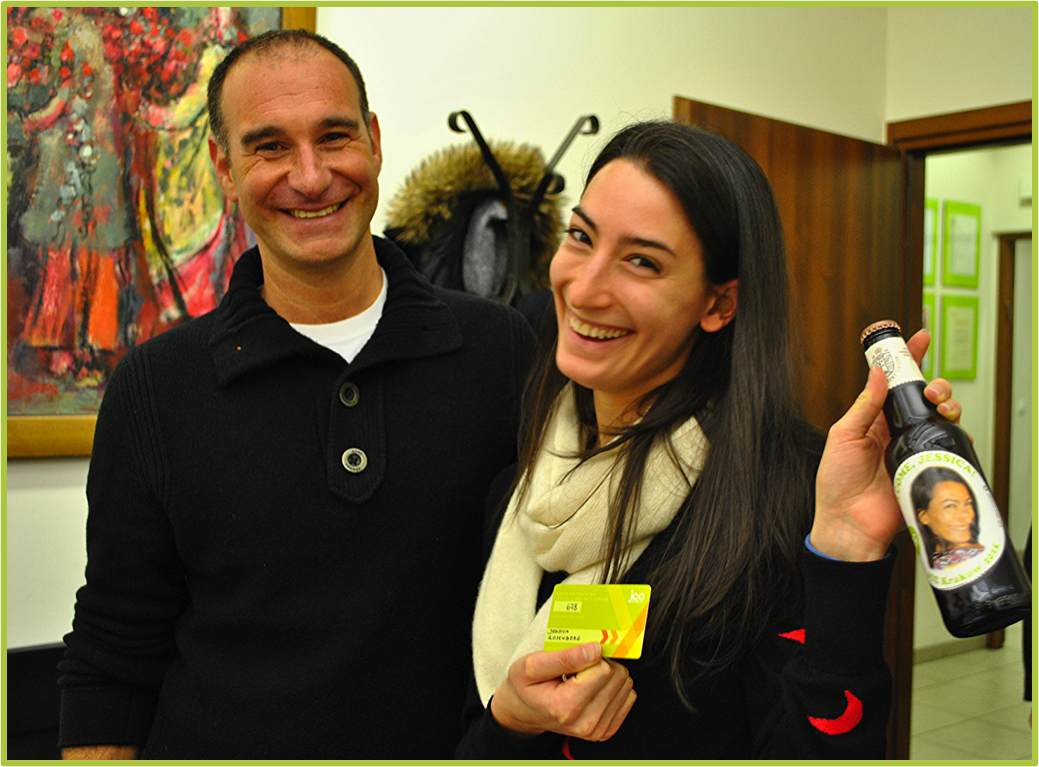Dr. Hugh Pollack and his wife, Martha visited JCC Krakow in October 2014. They had come to Poland expecting to find death and stories of despair. They left Poland inspired and energized by the unexpected life they found here!
Dr. Pollack, recently spoke about his trip to Poland at Town & Village Synagogue in NYC, where over the last 30 years he has assumed every leadership position - President for 4 years, Chairman of the Board for 16 years, Rabbi and Cantor Search Committee Chair, Ritual Chair, High Holiday Chair, Adult Ed Chair, Moss Concert Chair, Nominating Committee Chair, Dinner Dance Chair as well as serving as Chief Gabbai throughout the years and assuming the role of Chazzan sheini for the High Holidays for the past 20 years. His role at Town and Village Synagogue was recognized by the Wexner Foundation in electing him to the first class of Wexner Fellows from the New York region 22 years ago and by his receiving the prestigious Rothschild Award in 2011. Please find the transcript from his amazing speech below.
We came to Poland expecting to find death.
And death we found - in the death camps of Majdanek disturbingly situated with prewar homes and parks all around it as if it was just any business, in full visibility of the town’s population which could never claim innocence of not knowing what was going on, a camp which could easily in days be up running again churning out its acrid smoke from burned bodies. The monument associated with the camp covered a mountain of ashes from burned bodies.
We found death in touching the few pieces of the remaining wall of the Warsaw ghetto, where thousands suffered while spending their last days, if surviving only to face going to the Umschlagplatz the station at which trains arrived to take them to their eventual death at Treblinka. At the remnant of this station stands a memorial with only the first names of the tens of thousands who passed through there in order to bring home the point that these were real people with real names and real lives.
We came to Poland expecting to find death.
And death we found - in the death camps of Auschwitz and Birkenau, a camp as large as the eyes could see with hundreds of barracks, several gas chambers and crematoria, much of which was in ruin as they were destroyed by the Nazis when the camps were being liberated so as not to leave evidence of their unspeakable crimes against humanity.
We found death in the displays of tens of thousands of shoes left behind before their owner entered the showers, each with its own story to tell.
And we surely found death in the depths of the haunting children's forests, mass graves of thousands of children shot, some of whom were buried alive, covered over with lime. Small Israeli flags surround the borders of these mass graves; small dolls, toys, balloons and kites tied to the perimeter in an attempt to comfort those young souls who perished there; however in reality only slightly comforting us who desperately needed comfort upon witnessing such a horrific scene. Besides saying Kaddish we sang hamalach hagoel, the song sung to children before going to sleep, assuring these innocents of protection by god’s angels, protection which they hopefully had in death since they surely did not have such protection in life. And we finally recited the blessing for children that we use to bless our own children Friday nights at the beginning of Shabbat.
Every week I bless Deborah and David over the phone late Friday afternoon as I cannot do it in person since they’ve left home. Since Poland, every week when I bless them I can't help but think back to that moment in the children's forest. I can't tell you how long that feeling will remain as time drifts on but I sense that the memory will remain with me forever and inexorably tied to my own blessings each week for the rest of my life.
We came to Poland to find stories of death and despair.
We found such a story in the town of Tarnow, once a town with a thriving Jewish population of over 25,000 of which none remain today. One of the members of our group had heard stories about this town her entire life from her father who as a young child witnessed the events and atrocities that took place there. Because his father could fix machines like typewriters, the Nazis allowed her grandfather to keep his store – the only Jew allowed such privilege. Her father could not bear to come with us on this trip to return to this site; however we found her grandparents’ home with the outline of the mezuzah, the site of her grandfather’s store where there is now a bank, the site of her aunt’s cosmetic store and the cemetery where much of her family is buried. We found the largest building in town which had been a huge mikvah - now a gym and spa.
There were several shuls within a few blocks radius before the war. But the only remnant was four charred posts from a bima still standing in an open square. Before leaving for this trip, the father of this member of our group told her that he remembered watching this shul burn. However, the eastern wall remained standing regardless of how hard the Nazis tried to knock it down. As a 10 year old he remembered one Nazi soldier commenting to his comrade: This place is surely haunted by the devil!
And we found such a story in the work camp of Plashau, outside of Krakow, where Martha's second cousins were imprisoned after the Jewish ghetto in Krakow was liquidated. One cousin found herself on Schindler's list for his factory, which we also had the opportunity to visit, but she chose to stay with her younger sister who was bound for Auschwitz. So in the middle of the night, she snuck into another barracks, changed uniforms with someone else headed to Auschwitz who took her place on Schindler's list while she went to Auschwitz in order not to leave her sister alone. Miraculously, both escaped from the death march at Auschwitz, one eventually settling in Palestine and the other in New York. These were stories that we had always heard and even listened to when she was interviewed by Steven Spielberg for the archives he sponsors. But frankly it hadn’t seemed real for us. The story came alive in front of us when we witnessed these places ourselves.
More than 90 percent of Polish Jewry — some 3 million souls — died during the Holocaust, most of them murdered between September and December 1942 in Nazi death camps. Four months was all it took to wipe out an entire civilization. That world is forever gone.
If we came to find answers, we did not find any. Witnessing all of this evil first hand allows us to serve as living witnesses to these horrors. But it left many more questions than answers, questions which seem so incomprehensible, they can and will never be answered.
The only response we could muster were token moments of defiance to the perpetrators.
We held the Israeli flag in front of our entire group under the famous sign at the front of Auschwitz “arbeicht Macht frei”. Martha and I similarly held an Israeli flag standing on the train tracks at the entrance to Auschwitz. One sees Israeli flags all over these camps, many wearing it over their shoulders covering their back. For me personally, under my warm wool hat, my kippah that day had the engraved official Israeli national emblem - the kippah I received from the Israeli ambassador Ron Dermer when he was here on Yom Kippur.
Although not heroic by any means, these token acts did provide a very small feeling of satisfaction - by saying that the goal of this place - the annihilation of our people - did not succeed. Not only are we still here but with a state of our own, stronger than ever.
It was like a stone at the children’s forest, upon which we found writing left by an Israeli student visiting the site. It said: “Tanuch bshalom Yesh lanu medinah - Rest in peace. We have a state”
The significance and critical need for a strong Israel certainly becomes more than just words when walking through these camps. It becomes an existential necessity.
We came to Poland expecting to find death and no life. And there were places which certainly confirmed that expectation. Much of Poland is like a Jewish museum, beautifully reconstructed synagogues and yeshivot from another time - when Jews thrived in Poland - the yeshiva where Rabbi Meir Shapiro started the daf yomi, the shul in which we found listed the ancestors and namesakes of Abraham Joshua Heschel, the shul and grave of Rabbi Moshe Isserles, known as the Ramah who wrote the Mappah, the ashkenazic equivalent to Joseph Caro's Shulchan Aruch. Towns which were half or two third Jewish in 1939 have no Jews today. Poland sometimes felt like a haunted empty museum where we could only imagine the vibrant voices and activity within the walls we stood. We davened in some of these exquisite places but the davening felt empty and hollow.
And we saw what could only be described as a Jewish Disneyland - restaurants in Lublin and Kracow that were called Jewish Kosher style restaurants with menus listing items of iconic Jewish holiday significance like latkes or matzoh brei and other foods identified with Jews like gefilte fish and cholent. There were English and Hebrew stylized lettering on the signs outside looking as if it was from a Hebrew scroll, with either Klezmer style music playing or tunes from Fiddler on the roof inside. The waiters wore costumes as if they lived in a shtetl in the 1800s but the owners and workers were all non-Jewish. They were trying to capture the flavor of a by gone era, an era that for all purposes appeared dead today.
And so, yes, we found much of what we expected and what we came for.
But we found a lot that we did not expect!
There were so many preconceived notions and conventional wisdoms which I brought with me - that there was no Jewish life in Poland today, that the Poles were the worst of the anti-Semites.
But what I saw, what I heard, challenged many of those beliefs. Suddenly Poland and the Jewish issues involved were not as black and white as I had previously believed.
The history we learned challenged my understanding of Jewish Poland - how Jews for centuries from the Middle Ages until the 1800s were protected by the kings of Poland. They were actively welcomed and so Jewish life thrived, and grew. It was no coincidence that Poland for so long was THE center of world Jewry both in terms of the largest numbers, the high levels of Jewish literacy and knowledge and the intensity and vibrancy of Jewish life. Sounds a lot like American Jewry of the past 50 years.
Jews had been part of Polish society since the 10th century, and their presence had contributed significantly to the country’s economic and cultural development. Although a minority, They were an ever-present and public part of society. Before 1939, Poland was the most multicultural, multi-religious country in Europe.
The new $100 million dollar museum which just opened in Warsaw the week we were there hosted many dignitaries from The US and Israel at the gala opening including the JTS Chancellor. This is not a Holocaust museum but one which celebrates Jewish life and the contributions made by Jews in Poland through many centuries. Its name is the Museum of the History of Polish Jews.
Poland was 10% Jewish in 1939 and if we think New York has a strong Jewish identity, Warsaw was one third Jewish as was one quarter of Krakow’s population And it became apparent that Poland was not one large shtetl like Anatevka in Fiddler on the Roof. Going through the cemeteries and reading about the Jews in Warsaw made it clear that those Polish Jews were not unlike the Jews in New York today, ranging from the secular through more liberal to the more orthodox. They were highly educated - professionals and leaders in the general society, very much integrated into Polish society. Jews, were prominent citizens in Poland. Half the physicians in Poland were Jewish, and two Jewish political parties sat in the Polish Parliament in the 1930s. Certainly there were shtetls, and Hassidim — plenty of both. But the legacy of Polish Jewry is much richer and more variegated than the stereotype would have it.
We learned how the genius of the Nazis was demonstrated by the fact that when they first invaded Poland they imprisoned or killed all of Poland's enlightened leadership - clergy, academics, politicians, professionals, intelligentsia leaving Poland virtually leaderless thus enabling the more unenlightened parts of its society to rule without any guidance.
We heard stories of the many righteous Gentiles who risked their lives and their families lives to help, hide and rescue Jews. We met with a woman in her 80s who described how her father built underground bunkers outside the city and brought Jews out there to live and hide out while bringing them food and medication regularly. What kind of response but awe and appreciation for the heroism, generosity and humanity of others can one have upon hearing such heroic stories like this?
Our guide at Auschwitz was a young Polish woman who like her husband is a regular guide there. There are 200 guides – all non-Jewish. She admitted that she still finds the reality overwhelming and cannot lead groups for too many days in a row before requiring a break. She and her husband feel passionately about confronting the reality of their past in hopes for a very different future, one in which such atrocities could never happen again.
I was amazed to see in Auschwitz a huge number of tour buses, a few groups like us and several Israeli high school groups who travel there as a ritual of their education. But in that one day alone, I was stunned to see so many Polish groups - many school groups as well as some adult groups. This viewing of holocaust education first hand by the Polish population could only be seen as an extremely encouraging sign
We also witnessed individual non Jewish families and school groups in the huge Jewish cemetery in Warsaw who have taken it upon themselves to regularly clean and straighten up areas that they have in effect adopted
Young non-Jewish Poles are fascinated with their country’s vanished Jewish world, curious to find out more, and determined to preserve its past.
There are other countries, notably Germany, where non-Jews play a role in preserving Jewish culture. But nowhere else are they so integral to the process, for in few other places is the Jewish absence as total, while the Jewish history is as rich and as entwined with that of the nation as a whole.
Even though we had come to Poland expecting to find death, what I was truly unprepared for was the Jewish life we found.
One morning we davened at the main Warsaw synagogue where I had the privilege of taking the kohen Aliyah. It was remarkably active with daily minyanim and learning taking place, seeming to consist of primarily younger daveners. Some who we met are observant but did not know they were Jews just a few years ago. The chief rabbi of Poland joined us that morning, Michael Shudrich, ironically a JTS grad from Long Island who worked at Ramah many years ago. He spoke with us about the phenomenon of Jews discovering their roots every day. 90% of the three million Jews in Poland in 1939 were exterminated in the Shoah. But 300,00 remained. When the Communists came in, a sizable number left but many also remained and went underground, not unlike the Marranos of Spain and Portugal 500 years earlier
It was best and safer not to tell their children about their Jewish roots or heritage
But in the past few years, with the communists gone and a more open society developed, as these parents and grandparents are now quite old, a common phenomenon is that on their deathbeds they are telling their children and grandchildren: By the way we never told you but you're Jewish, or you mother or father is Jewish or your grandparents on one side were Jewish. Every day the chief rabbi receives calls from such Poles with such stories as well as from others who say things like: My grandmother always made this odd food every year In the spring. Does it mean anything? Or when my grandmother was losing when playing cards with me as a child, she would shout Oy Vey! Does this mean anything? And the answer he gives is yes it does mean something.
Suddenly all of these young Poles are finding out about their own heritage and are searching out their roots and figuring out what being a Jew means for them today. The reactions range across the spectrum. Some are just learning and exploring, some who are halachicly non Jewish are converting and others have become fully observant.
When asked how many Jews there are in Poland today, the chief rabbis response was first of all it depends on your definition - whether it is a halachic definition or some other parameter. But regardless of the measure used, his answer to the question of how many Jews there are in Poland today is simply: More than yesterday
In Krakow we visited the JCC, a beautiful facility in the heart of the old Jewish historic district, Kazimierz where seven pre-war synagogues still stand. Along with the gorgeous sukkah still standing outside, it was one of the more beautiful JCCs I had ever seen with exquisite artistic posters for the JCC reflecting themes concerning each holiday (you should check out the website).
The story behind how the building came to be completed just a few years ago is remarkable. Prince Charles traveled through Krakow several years ago. Looking to take on a philanthropic venture, he met with some older Jewish Polish women who had lived through the war. Imagining that this was all that was left of Polish Jewry, he asked them what they needed and they responded - a place to meet together and have a meal together. So he committed to building a meeting place and kitchen for the elderly Jews left in Krakow.
But as the situation began to change in terms of young Polish Jews coming out of the closet - well talk about chutzpah, - a few leaders of the community had the audacity to go to London to meet with the Prince and put forward a new bolder vision for a full service JCC. And to everyone's surprise, he agreed and funded the construction of this new JCC.
We met with its founder and director Jonathan Ornstein, a young guy from queens who made Aliyah and then found himself in Poland. They don't ask questions about ones Jewish roots - whether one is halachically Jewish or not - everyone is accepted. He has created a thriving and vibrant JCC with children's programs, Hebrew classes, conversion classes, weekly Friday night dinners which draw well over a hundred participants. They sent 60 members two weeks ago to the Polish Limmud conference in Warsaw. Their weekly email - you should join their email list - has a video download - What's the Parsha Pani Zosia?- where one of their members - discusses the parsha and gives a dvar Torah in Polish but with English subtitles.
We were so impressed by the vibrant Jewish life developing there that Martha and I joined as Overseas Members once we got home.
They have a fundraising annual 55 mile bike ride we hope to return to do. The publicity around the ride declares that it is not just to remember Jewish history, but to celebrate and support the miraculous rebirth of Jewish life in Poland today. It sounds surreal but the route goes from Auschwitz to the JCC. It is quite a journey not just in distance or time but a journey through different Jewish eras and realities, a journey in the transformation of Polish Jewish life - from the unbearable Jewish past to an inspired Jewish future.
They do not lock their front door and since opening have never had one incident of graffiti, of vandalism or verbal assault even more astounding is they have 50 non Jewish volunteers! Just think about that.
On a typical Friday night, Shabbat services are held at the JCC, as well as across the street in an Orthodox synagogue and, often, next door at the Temple Synagogue, the city’s historically Reform synagogue Groups amble between the three buildings, and the singing can be heard from the street.
We wore Kippot publicly and felt fully comfortable. Try doing that in France or England today!
Jonathan proudly says that with public displays of anti-Semitism more and more common throughout Europe, Poland is a great place to be Jewish. How bizarre is the fact that Jews from Paris are moving to Warsaw to live in a safer environment. Jonathan points out that “This is the only place in Europe where it’s easier and safer and better every day to be Jewish, and all of this is happening an hour’s drive from Auschwitz”.
“It’s counterintuitive. The one bright Jewish spot in Europe is Poland. It’s a story that needs to be told”.
On hearing and seeing this story unfolding, I felt like I was in one of those Star Trek parallel universes where everything is reversed - the bad guys are the good guys and vice versa.
Both of these men - the chief rabbi Michael Shudrich and the JCC Director Jonathan Ornstein are in Poland because they believe that what they are doing is a mission of kedusha - recovering lost Jews. For them, their work would be analogous to being able to go back to Spain and Portugal in the late 1500s and recovering the tens of thousands of lost Marrano Jews only one or two generations after 1492. The millions murdered in Poland can never be brought back. They are lost forever. But there is still hope for the estimated tens of thousands of Polish Jews who are yet to be identified, who are still lost to us and lost to themselves. They can be brought back and are being brought back thanks to the commitment and vision of leaders like Michael Shudrich and Jonathan Ornstein.
I began today by saying that we went to Poland to find death - and found it. Those haunting memories will always be with us – how could they not?
But what stays with me every day since then is the unexpected life that we found. That is what leaves me inspired and energized.
I have always had difficulty during davening with the line in the Amidah Machete Hamitic – the belief and prayer for God resurrecting the dead during the Messianic era. I always appreciated Yitz Greenberg’s observations on it – commenting that the Orthodox embrace it, the Reform have removed it from their liturgy and the Conservatives don’t translate it so no one really knows what they’re saying.
That morning in the synagogue in Warsaw while davening Shacharit, I came to this line and suddenly it took on different meaning. Had I not seen with my own eyes what to me was a miraculous coming to life, an unimaginable rebirth of Polish Jewry. Just as I had witnessed the death, I had also witnessed the life emanating from this seemingly dead corpse of a country. This I could finally comprehend as mechayeh meytim, a true resurrection if only metaphorically. So that morning when I recited the Amidah, I could actually recite that line with a full heart.
And every time I daven since them, I say in full voice Bruch Utah Adonai Mechayeh Hameytim – grateful to God who surprises us sometimes in truly bringing life from death.
